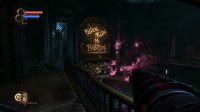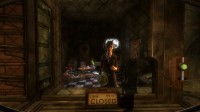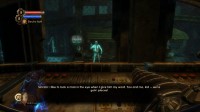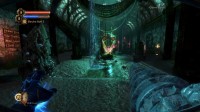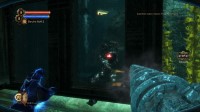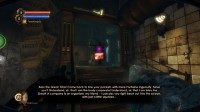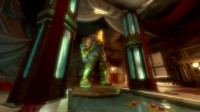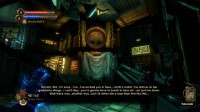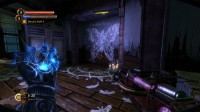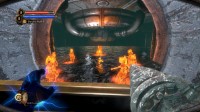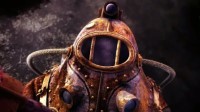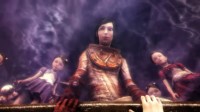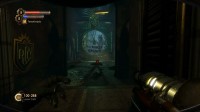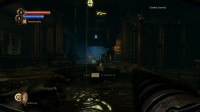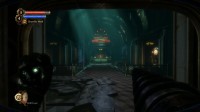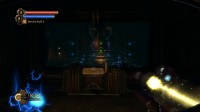Bioshock 2
Playtime: 19.7 Hours (15.6 Hours Base, 4.1 Hours Minerva's Den)
Finished 05 October 2024.Hard Mode, no Vita-Chambers, mostly used the drill in the base game. Really liked the laser in Minerva's Den so naturally didn't touch Drill Specialist there, which is also partially due to the fact that the Drill isn't as powerful there. Played the Remastered version on PC, which is known to have some serious stability issues; while I didn't actually encounter many crashes myself, I still adopted a pretty extreme habit of quicksaving just in case.
On another note, at some point I learned that there is a tie-in book to the series which serves as kind of a prequel to the Rapture saga of the Bioshock games. I decided to start reading it pretty much the moment I finished Bioshock 2, so I figure I might as well add some comments about it here too.
For being considered the dark horse of the series, particularly in the wake of Bioshock 1, this really was a damn fine game to play through; I kind of question if our collective standards for the quality of sequels & the classification of a "cash grab" game have truly slipped so far in the past decade or so, or if people just had abnormally extreme expectations for a follow-up to B1. Probably the most critical and notable difference in the quality of the overall experience, at least in my eyes, was in the plot - particularly with regards to the central villain, Sofia Lamb. Unlike the strong characters of Fontaine and Ryan in the first game, Sofia's character is written in a far more muddled fashion, straddling an inconsistent line between collectivism through communism while simultaneously failing to realize how her ego inflates her opinion of her abilities. I know it was always inevitable that the sequel would cause some disappointment in the plot - after all, how do you top a plot twist THAT iconic? But Sofia's character, as well as the entire motivation of the Family, fell completely flat in this game.
I'll continue harping on Sofia's character for a bit longer, since I consider it to be probably my biggest disappointment with the entire experience. I feel like in Bioshock 1, Ryan's strong ideals regarding individualism were so relevant in the plot because of the foil that Fontaine's character provided, which completed the thought experiment of Ryan's philosophy put to the test. The ruins of Rapture came about due to a clash between Ryan's expectations versus Fontaine's reality, but the thing is that there really was a semblance of order and progress within Rapture that only occurred because of Ryan. There was a golden age of medical, technological, and societal progress within the city before the Civil War, even if the situation behind the scenes was far more sinister. But contrast all of that with Lamb's Family in B2... and we see little more than a shadow of B1. Her civilization, her peace and order within Rapture already collapsed before the events of the game - if they ever got off the ground to begin with. Her movement began with a violent prison break by thugs and criminals, and has been comprised only of drug-addled splicers with the 'family' nowhere in sight. True, Ryan's utopia crumbled under Fontaine's ambitions, but Sofia can't even cobble together a facade of dignity. So why should a player feel intimidated by her character, or care about her cause? There isn't any reason - so she's little more than a loudmouth who yells in your ears a few times while you make your way to Eleanor.
With that said, there's a meta "twist" that I enjoyed in this game, which is Sinclair's character. The entire game kind of sets him up to be a bit of a greaseball: from his too-smooth-to-be-true Southern accent trying to sweet-talk you from second one, to all of the audio tapes scattered around the game revealing how much of an opportunist and profiteer he was before the fall of Rapture, you expect he's got several things hidden under his sleeves that aren't really to your benefit. While it's very true that he generally kept his hands clean and didn't actually reportedly do anything horribly heinous, he definitely did try to take advantage of anybody and everybody he could - remember, he was in Rapture for a reason. To go even further though, he is very reminiscent of Atlas from the first game, who similarly acted as a gentle figure guiding you through Rapture before stabbing you in the back. So when you get a chance to see his true colors in Persephone, it's quite moving to see that he really didn't give up on Delta, seeing him as the only hope for Eleanor to escape. It's a damned shame that he was beyond saving by then. You come to care more about him than your actual objective (Eleanor) even. But yeah, overall for a game centered around the philosophy of a community or 'family', the attachments you have with most characters is kind of weak, which is a pretty severe shortcoming if I really think about it enough.
There's not too much to say about the mechanics of this game, since they feel very similar to Bioshock 1 with only minor changes to weapons and upgrade systems. I don't think it's much an issue though, since they worked well in B1 and the game still feels great to play here in B2. So I'll comment briefly on a few major additions/changes. The drill is absolutely awesome; it's such a satisfying weapon to use, both when smashing it on someone like a giant sledgehammer, and particularly when nailing someone with a Drill Charge - the best mechanic in the game. I didn't even consider a melee run in B1 since I liked the guns more, but dashing around in B2 running splicers over like a freight train made it very tempting; I think I was about 60-70% drill by the end of the game. Overall, getting a chance to play as a Big Daddy in this game was great! I loved the feeling of weight in the suit (you're like an earthquake when walking around), but the snappiness of the game doesn't suffer at all for it; they managed to strike a perfect balance between the two. The little gameplay element allowing you to actually gather with the Little Sisters instead of immediately saving or cursing them was a fun little touch too, and gave more opportunities at defensive gameplay compared to the first game.
Overall, I found this game very worthy as a successor to B1 in the mechanical sense, but clearly from the above I feel like the lasting impact of the characters and story amount to little more than a footnote compared to the impact of the first game. Also I want to note how disastrous the remaster for Bioshock 2 apparently was; it's strange that I had almost no issues with the game whatsoever, only crashing a couple of times across my 20-hour playtime, but there are tons of reports of people constantly crashing every few minutes, not being able to save, among so many other gamebreaking issues - and none of them were ever fixed.
Minerva's Den
This DLC for Bioshock 2 has a very good reputation, and I found that reputation to be well-founded. It has a very reasonable length of around 4-5 hours, depending on how much you explore, and has a lot of new and interesting content. The laser is a really fun and useful weapon, the new Lancer Big Daddies are intimidating yet fun to fight against, the Gravity Well plasma is super fun to use and abuse. But more importantly, the new areas of Rapture are pretty interesting to explore, and the plot and characters introduced are very interesting, providing a really nice look into another part of Rapture, isolated from the fires of the Civil War and the corruption of Sofia's family. I found the story of C.M. Porter (and Reed Wahl) to be quite interesting, and the twist - while not entirely unexpected - was very effective, even if you already had your suspicions of Subject Sigma's identity before. It could be said that Minerva's Den is overall the best part of Bioshock 2, without the issues that the base game had in pacing and characters, and is one of my personal gold standards for both the quality and quantity of a content expansion in any game. I'm just a bit sad about its short length, since it doesn't give you enough time to really flesh out your upgrades and build before the experience is all over.
The book is a prequel of sorts to the events of Bioshock 1 (and by extent, to Bioshock 2 as well) and provides a lot of context for the creation of Rapture, its early years, and all of the conditions leading to its eventual collapse - ending right around the time that the Civil War goes into full swing. The majority of it is centered around the perspective of Bill McDonagh, Andrew Ryan's general contractor and one of his closest confidants up until his disillusionment and death trying to escape Rapture before the war destroyed the city. This is probably the most interesting era of Rapture not visited by the games (since there's nothing to shoot at yet), since it goes through a lot of the motivations that Ryan has - his irritation with the American government, his fear of nuclear weapons at the conclusion of WWII, his hatred of anything Bolshevism or communism, given his personal history escaping the USSR as a young child.
It also shows how Fontaine had planned the takeover of Rapture over Ryan from the start, going from running small scam operations to planning out the biggest con of his life - how he took advantage of Ryan's strict philosophy of individualism and lack of government intervention to spurn the order of Rapture right under Ryan's nose, even with all of Ryan's suspicions. It sets the stage for the arrival of Atlas; how he got a cosmetic surgeon to disguise a follower as Fontaine while he took on a new face and moniker. All of these behind-the-scenes plots, as well as the mounting societal pressures existing day-to-day in the city, all show how Rapture was always destined for failure, regardless of Fontaine's troublemaking. A scene that I vividly remember is how one shopkeeper was being put out of business since a rival store owner took over local garbage collection and kept dumping all the trash at the front of his store, driving away customers. Ryan refuses to intervene because of his policies, so the shopkeeper ends up taking it into his own hands by killing the crooked store owner in the middle of the street, before offing himself in desperation. That, and the countless scenes depicting the horrid living conditions of people moving to Rapture for opportunities, only to wind up trapped like slaves in the dregs of Rapture's society.
There isn't too much more to say, since I think it would probably be better overall to just read the book for all the background information & anecdotes on the events setting up the stories of Jack & Subject Delta. I see Ryan as a character conflicted between ideals & ego - who enforces the rule until he finds himself disadvantaged by them. Fontaine is a ruthless con man, yet brillian social opportunist, knowing the extents to which he can push the rules and take whatever he can get his grubby hands on. Tenenbaum's demented character, built upon a obsessive focus on science and experimentation above morality, manages to kind of chip away at the quasi-savior status she kind of has by the timeframe of the games, painting her overall personality in a more truthful light. But to be honest, Sofia still doesn't seem to have much of a purpose in this story either; the game talks about her incarceration at Persephone and her escape to build her own faction, but her ideals are just as addled and nonsensical as they are in Bioshock 2 and the book eventually drops her plotline completely, focusing on the Fontaine-Ryan conflict instead because there's more meat on the bone there.
In any case, I really enjoyed the book (and McDonagh as a character) - I thought it was really enjoyable and well-paced as a story, and also happened to appreciate all of the setup for things you see or notice in the games. I think it really requires full playthroughs of both games before reading though, otherwise a lot of initial context and callbacks to audio logs, locations, events, etc. will probably be missed in the text by the reader.
